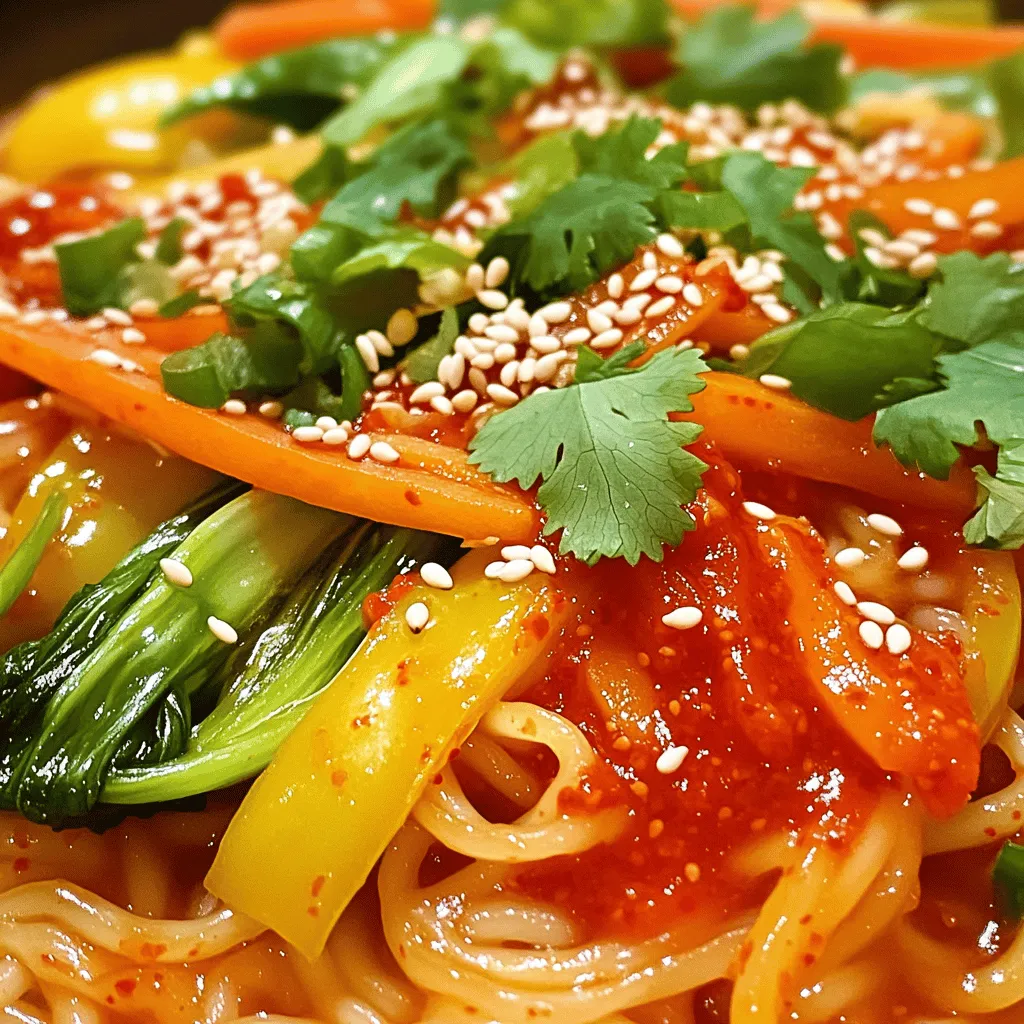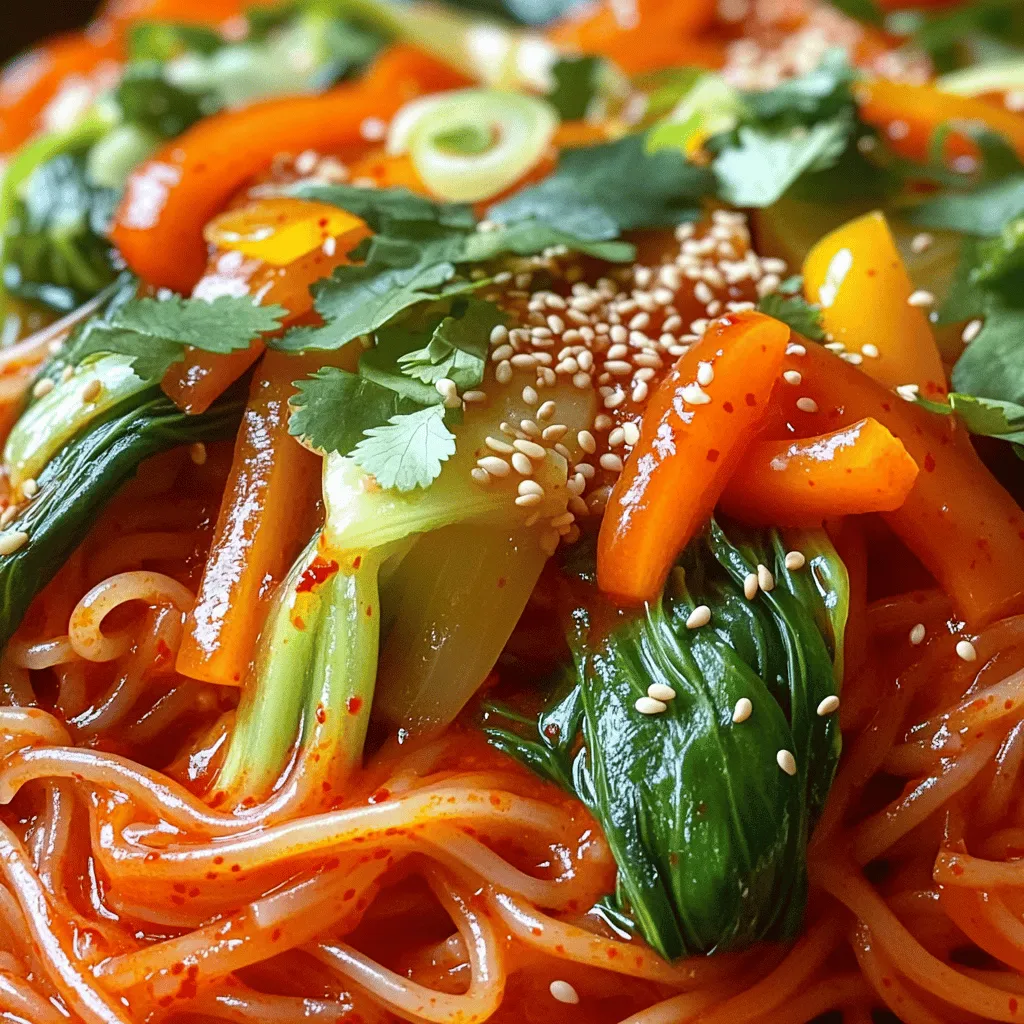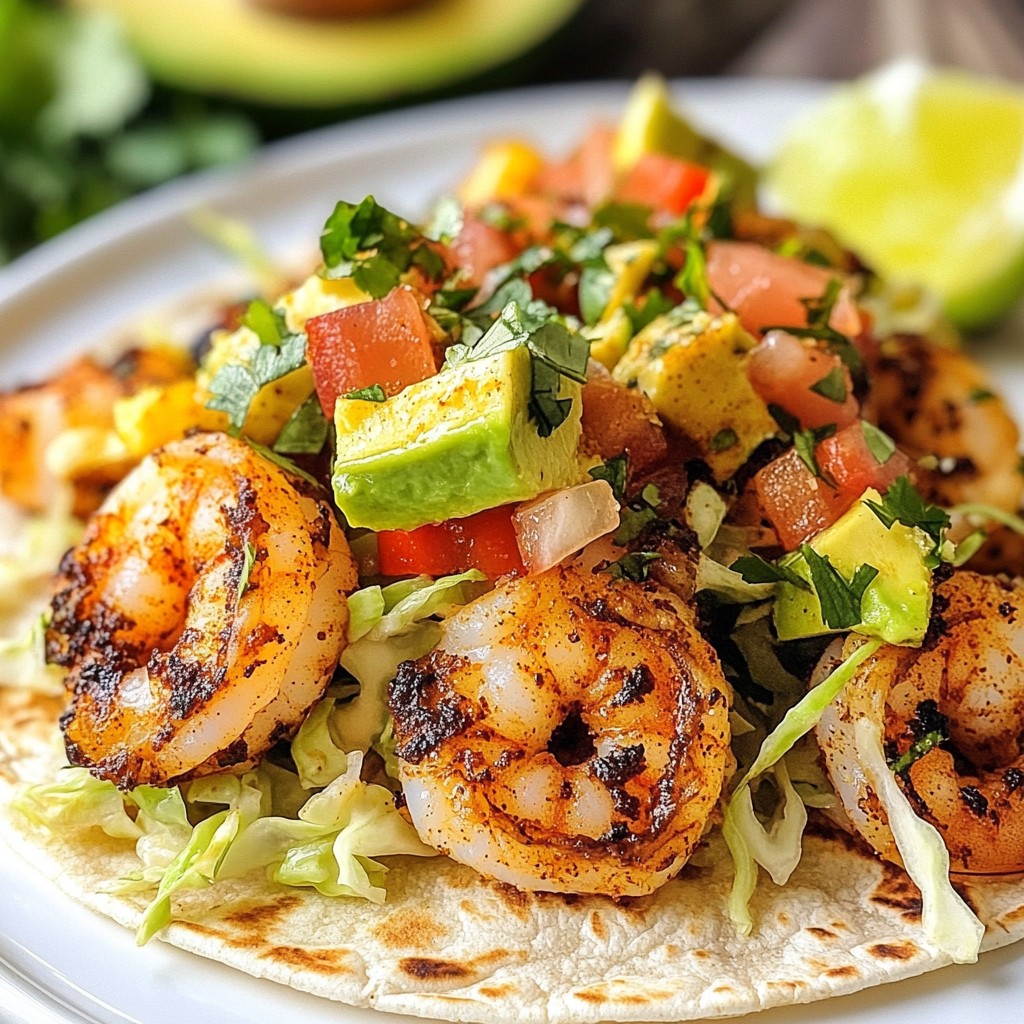Looking for a quick meal that packs a spicy punch? Try my Spicy Gochujang Noodles! This delicious dish is easy to make and perfect for busy weeknights. With bold flavors from gochujang and fresh veggies, you’ll impress family and friends. Plus, I’ll share tips on perfecting your dish and customizing it to your taste. Ready to spice up your dinner routine? Let’s dive in!
Ingredients
Complete List of Ingredients for Spicy Gochujang Noodles
To make these tasty noodles, you need:
– 200g thick rice noodles
– 2 tablespoons gochujang (Korean chili paste)
– 1 tablespoon soy sauce
– 1 tablespoon sesame oil
– 1 tablespoon honey (or maple syrup for a vegan option)
– 1 teaspoon grated ginger
– 2 cloves garlic, minced
– 1 cup bok choy, chopped
– 1 carrot, julienned
– 1 bell pepper, sliced
– 2 green onions, chopped
– Sesame seeds for garnish
– Fresh cilantro leaves for garnish
Substitutions for Common Ingredients
If you don’t have an ingredient, don’t worry! Here are some easy swaps:
– Use rice vermicelli instead of thick rice noodles for a lighter bite.
– Tamari can replace soy sauce for a gluten-free option.
– You can swap honey with agave syrup for a vegan choice.
– Any leafy green works if you can’t find bok choy, like spinach or kale.
– If you lack fresh ginger, use ground ginger; just use less.
Best Brands of Gochujang Sauce
When choosing gochujang, quality matters. Here are some brands I trust:
– Chung Jung One: A widely loved brand with great flavor.
– Sunchang: Known for its rich taste and authentic texture.
– Haechandle: Offers a balanced spice level, perfect for beginners.
Look for gochujang in Asian markets or online for the best options.
Step-by-Step Instructions
How to Cook the Rice Noodles
To cook the rice noodles, first, boil water in a large pot. Add the noodles and cook them according to the package instructions. This usually takes about 5-7 minutes. Once they are tender, drain the noodles. Rinse them under cold water to stop the cooking. This keeps them from getting mushy. Set the noodles aside while you prepare the sauce and vegetables.
Preparing the Gochujang Sauce
Grab a small bowl to make the sauce. Add 2 tablespoons of gochujang to the bowl. Then, mix in 1 tablespoon of soy sauce, 1 tablespoon of sesame oil, and 1 tablespoon of honey. For a vegan option, use maple syrup instead of honey. Add 1 teaspoon of grated ginger and 2 minced garlic cloves. Stir everything together until it is smooth. If you want more heat, add a little extra gochujang.
Sautéing Vegetables: Essential Tips
In a large skillet, heat a bit of oil over medium heat. Add 1 cup of chopped bok choy, 1 julienned carrot, and 1 sliced bell pepper. Sauté these for about 4-5 minutes. You want them tender yet crisp. Stir them often to cook evenly. This step adds great flavor and color to your dish. Once done, set the veggies aside to mix with the noodles later.
Tips & Tricks
Perfecting Your Gochujang Noodles
To make the best gochujang noodles, start with quality rice noodles. Cook them just right. They should be tender but not mushy. Rinse them in cold water after cooking. This step helps keep them from sticking.
When mixing the sauce, balance the flavors. The gochujang brings heat, but honey adds a sweet touch. Adjust the sauce to your liking. Taste as you mix, and tweak it until it feels perfect.
Heat Adjustments for Different Spice Levels
If you enjoy a milder dish, use less gochujang. Start with one tablespoon and taste. You can always add more later. For those who love heat, add an extra teaspoon. Just remember, gochujang can be strong, so go slowly.
Another way to adjust heat is through toppings. Fresh cilantro and sesame seeds mellow the spice. You can also add a splash of lime juice for a fresh twist.
Garnishing Ideas for Presentation
Garnishing makes your dish look great and tastes even better. After plating the noodles, sprinkle sesame seeds on top. They add a nice crunch.
Chop fresh green onions and sprinkle them over the dish. They add color and a fresh taste. Fresh cilantro leaves brighten up your noodles. You can also add thin slices of red chili for a pop of color and more heat.
These small touches make a big difference in how your spicy gochujang noodles look and taste!

Variations
Vegetarian and Vegan Options
You can easily turn this dish into a vegetarian or vegan meal. For a vegan option, swap honey for maple syrup. This change keeps the sweetness while making it plant-based. You can also add more veggies to boost flavor and nutrition. Try adding zucchini or mushrooms for extra taste.
Protein Add-Ins: Tofu, Chicken, or Shrimp
Adding protein makes this dish heartier. Tofu is a great choice for a vegetarian option. It absorbs flavors well and adds a nice texture. If you prefer meat, chicken or shrimp work great too. Just sauté your protein before adding it to the noodles. This way, it cooks fully and adds depth to the dish.
Alternative Vegetables to Use
Feel free to mix and match the veggies in this recipe. Broccoli, snap peas, or bell peppers add crunch and color. Each vegetable brings its own taste, making your meal interesting. You can also use frozen veggies if you’re short on time. They cook quickly and save you prep time.
Storage Info
How to Store Leftovers
To store leftover spicy gochujang noodles, first allow them to cool. Place the noodles in an airtight container. Keep them in the fridge for up to three days. Make sure to separate the sauce if you want them to stay fresh longer.
Reheating Tips for Best Texture
When reheating, add a splash of water to the noodles. This helps them stay moist. Use a pan over medium heat for best results. Stir often to heat evenly. If using a microwave, cover the dish with a damp paper towel. This will keep the noodles from drying out.
Freezing Guidelines for Spicy Gochujang Noodles
You can freeze spicy gochujang noodles, but it’s best to freeze the sauce and noodles separately. Use freezer-safe bags or containers. The noodles can stay fresh for up to two months. When ready to eat, thaw them in the fridge overnight. Reheat as mentioned above for the best taste.
FAQs
What is Gochujang and Where Can I Buy It?
Gochujang is a Korean chili paste. It has a sweet and spicy flavor. You can find it in Asian markets or online. Look in the international aisle at larger grocery stores. Brands like Sunchang and Chung Jung One are popular.
Can I Make Spicy Gochujang Noodles Gluten-Free?
Yes, you can make this dish gluten-free. Use gluten-free soy sauce instead of regular soy sauce. Also, check the rice noodles to ensure they are gluten-free. Many rice noodles are naturally gluten-free, making them a great choice.
How to Customize the Dish to Suit My Taste?
You can easily change this dish to fit your taste. Here are some ideas:
– Add more vegetables, like mushrooms or zucchini.
– Adjust the spice by adding more or less gochujang.
– Swap honey for maple syrup for a vegan option.
– Include protein like chicken, tofu, or shrimp for extra flavor.
These tweaks can help you create a dish you will love!
Spicy Gochujang noodles are a simple and tasty meal. We covered the ingredients, cooking steps, and helpful tips. You can choose different spices, veggies, and proteins to make it yours. Storing leftovers and reheating them right will ensure great flavor later. This dish is easy to adapt to your needs. Enjoy your cooking and make it fun! Dig into this spicy delight whenever you want a quick and satisfying meal.




